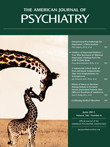The Short-Term Effect of the Recent Great Earthquake on the General Functioning Status of Psychiatric Patients Near Tokyo
To the Editor: Kitasato University East Hospital is located about 40 km southwest of Tokyo. During the earthquake on March 11, 2011, the movement around us measured upper 5 on the Japan Meteorological Agency seismic intensity scale. During the first week after the earthquake, I treated 155 psychiatric patients, of whom 141 had regularly consulted me before. These included 120 outpatients (54 with a diagnosis of epilepsy, 32 with schizophrenia, 11 with a mood disorder, eight with an adjustment disorder, five with dementia, and 10 others) and 21 inpatients (two with epilepsy, nine with schizophrenia, four with mood disorder, five with adjustment disorder, and one with dementia). No patients with acute stress disorder came to see me during the first week after the earthquake, and almost all of the patients who did come for treatment expressed their fear of the quake and the aftershocks.
Of those 141 regular patients, five (three outpatients and two inpatients) experienced either a marked increase in seizure frequency or a marked decrease in score on the Global Assessment of Functioning Scale (GAF) during that first week. An outpatient with epilepsy was admitted to another hospital for the treatment of status epilepticus that might have been related to aspiration pneumonia after the quake. An inpatient with temporal lobe epilepsy has been experiencing complex partial seizures every time an aftershock occurs, and an inpatient with schizophrenia saw for the first time vivid visual hallucinations of clouds of eels crawling on the floor (the patient's GAF score decreased from 55 to 30). An outpatient with delusional disorder expressed her strong wish to have committed suicide before the terrible quake (her GAF score decreased from 50 to 35), although she did not attempt it. An outpatient with adjustment disorder needed a new prescription (her GAF score decreased from 85 to 60). Interestingly, two outpatients with schizophrenia reported that their sleep-wake cycle had somehow improved after the earthquake. The remaining patients showed no major change in their functional status during the first week after the earthquake.



